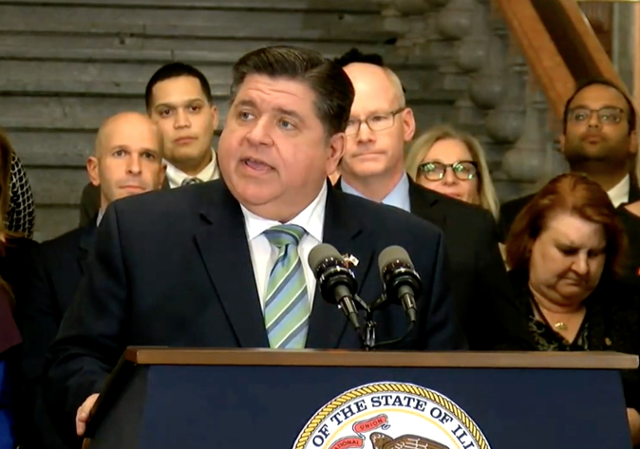
CHICAGO – The Pritzker administration today launched the application to apply to become a State-Designated Cultural District in Illinois. State-Designated Cultural Districts are communities, towns, or specific geographic areas that have a distinct shared historical and cultural identity that binds the community together. Once selected, the state plans to make $3 million available to State-Designated Cultural Districts, and through the designations, aims to uplift the unique contributions of historic cultural districts with the goal of increasing economic development opportunities.
Get The Latest News!
Don't miss our top stories and need-to-know news everyday in your inbox.
“Here in Illinois, we’re deeply proud of our many historically and culturally rich communities,” said Governor JB Pritzker. “That’s why we’re launching the State-Designated Cultural Districts application to support areas that are facing challenges preserving their unique identities. We’re proud to invest $3 million to promote greater growth, development, and opportunities in areas across the state over the next two years.”
“Illinois will proudly stand to ensure the contributions of our communities are preserved and uplifted because our diversity is our strength. We are investing in State-Designated Cultural Districts to celebrate the shared histories and cultures that bring vibrancy to our state and to drive local economies forward," said Lt. Gov. Juliana Stratton. "I applaud Governor Pritzker and leaders at the Department of Commerce and Economic Opportunity for fostering Illinois’ diversity."
The State-Designated Cultural Districts opportunity is open to localities, municipalities and community-based non-profit organizations through a competitive Notice of Designation Opportunity (NODO). As outlined in statute, a maximum of five State-Designated Cultural Districts can be selected each calendar year. The Department of Commerce and Economic Opportunity (DCEO) anticipates designating five Cultural Districts in 2023 and an additional five in 2024. To be selected, applicants must demonstrate the ways in which they have a distinct cultural identity and have historically faced challenges preserving their unique cultural attributes due to gentrification, displacement or the COVID-19 pandemic. Full information for applicants can be found on the application webpage.
“Illinois’ diversity is its strength, and designating Cultural Districts will help preserve and promote the unique histories and cultures of our communities,” said DCEO Director Kristin Richards. “From attracting visitors to encouraging growth and opportunity in designated districts, this first-of-its-kind program will bolster economic development in communities across the state.”
The definition of State-Designated Cultural Districts is intentionally broad in state statute in order to empower communities and geographic areas to collaborate on applications based on the shared characteristics and experiences that bind them together, such as ethnic identity or shared history. There are no population or geographic limitations on what defines a Cultural District and it could take many forms, for example, a main street business corridor, an entire rural town, or a historic geographic cluster in a larger city. Applications will be evaluated based on the needs of the community, capacity to serve as a Cultural District, and quality of the application submitted.
The goal of the State-Designated Cultural Districts program is to encourage economic development; support the preservation and development of history and culturally significant structures, traditions, and languages; foster local cultural development and education; provide a focal point for celebrating communities’ unique cultural identities; and promote equitable growth and opportunity without generating displacement.
Once selected, Cultural Districts will be designated for a period of 10 years. Once 10 Cultural Districts are designated in calendar years 2023 and 2024, DCEO will make available $3 million for districts to apply for funding. The funding opportunity will be tailored to fit the needs of individual Cultural Districts and will broadly support the goals of the program to foster economic development and help communities preserve their unique cultural identities. Cultural Districts will also benefit from increased exposure from the designation, as well as additional potential future funding opportunities that prioritize Cultural District designations.
The program design and criteria were developed in partnership with the State-Designated Cultural Districts Advisory Committee, which consists of legislators, community members and cultural leaders from throughout Illinois.
“Preserving the history of our culture through State-Designated Cultural Districts is critical to ensuring these stories stay alive for generations to come,” said Rep. Carol Ammons (D-Urbana). “The opportunities provided by this program will be able to provide a significant economic impact on historically disinvested communities across our state by highlighting our presence today and our contributions throughout history.”
“The historic State-Designated Cultural District program provides an opportunity to celebrate cultural significance of diverse groups across our great state,” said Sen. Ram Villivalam (D-Chicago). “Community members and visitors will not only have the chance to learn the storied histories of these districts, but the official state designations will also boost economic development with more tourists and increased traffic at local businesses.”
Application Information
Application Page: https://dceo.illinois.gov/omee/state-cultural-districts-nodo.html
Application Deadline: October 23, 2023, 5:00 p.m.
Eligibility: Localities & community-based non-profits may apply
Information Session (Webinar):
- Tuesday, September 26, 2:00 p.m.
- Registration Link: https://bit.ly/3RvGAo1
More like this:
